Business Ethics Assignment Solution - Semester 1, University Name
VerifiedAdded on 2020/04/15
|5
|688
|42
Homework Assignment
AI Summary
This document presents a comprehensive solution to a business ethics assignment, addressing key concepts and providing detailed explanations. The assignment explores the definition of professionals according to different perspectives, including the ethical standards and specialized knowledge they possess. It examines the moral obligations of professionals, the reasons behind these obligations, and the ethical dilemmas they may face. The solution provides examples, such as the Rana Plaza incident, to illustrate ethical challenges. It also discusses informed consent, its application, and situations where it may be absent. Finally, the assignment addresses the purpose of ethics, emphasizing its role in promoting moral behavior and well-being. The document offers a thorough analysis of each question, making it a valuable resource for students studying business ethics.
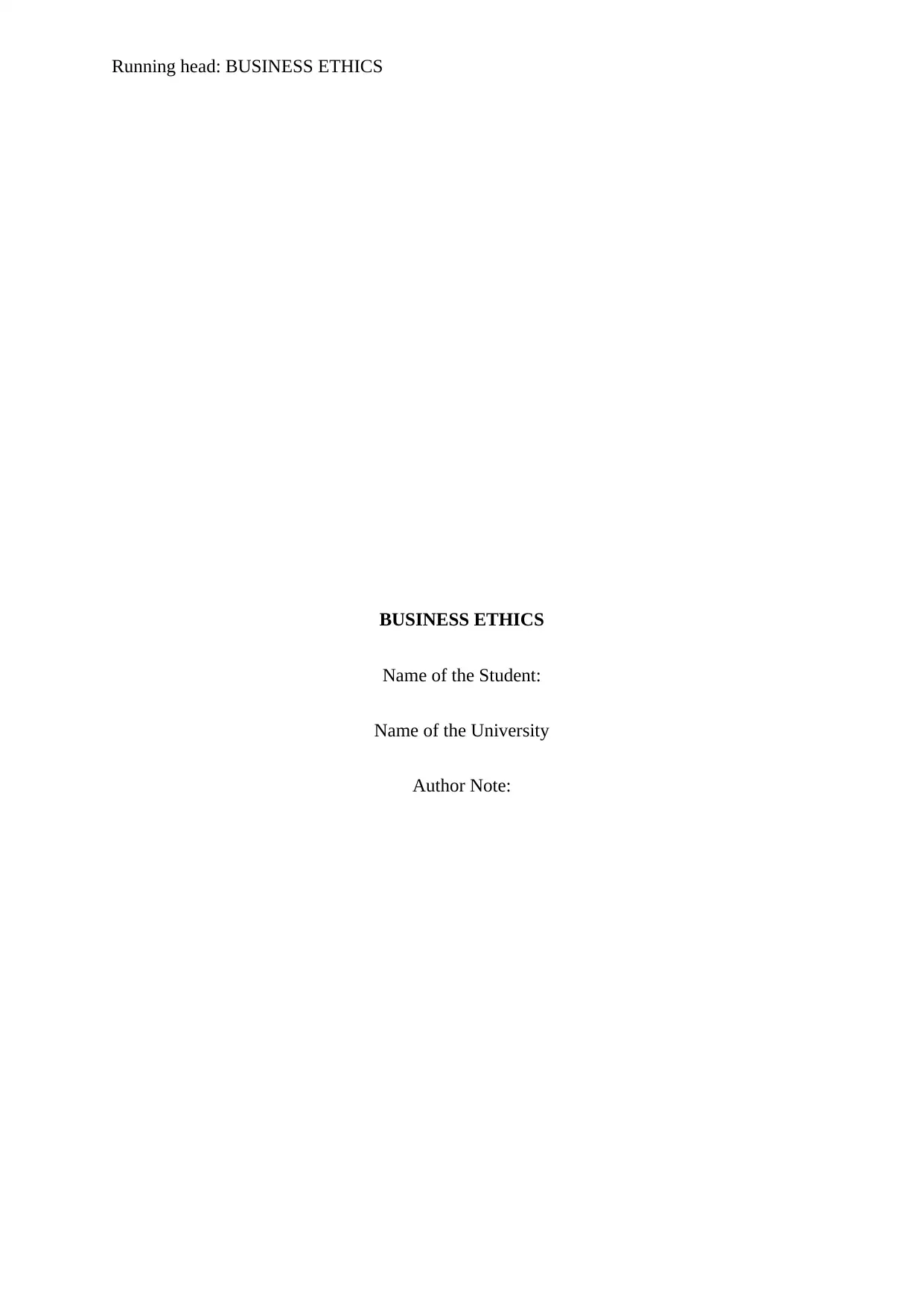
Running head: BUSINESS ETHICS
BUSINESS ETHICS
Name of the Student:
Name of the University
Author Note:
BUSINESS ETHICS
Name of the Student:
Name of the University
Author Note:
Paraphrase This Document
Need a fresh take? Get an instant paraphrase of this document with our AI Paraphraser
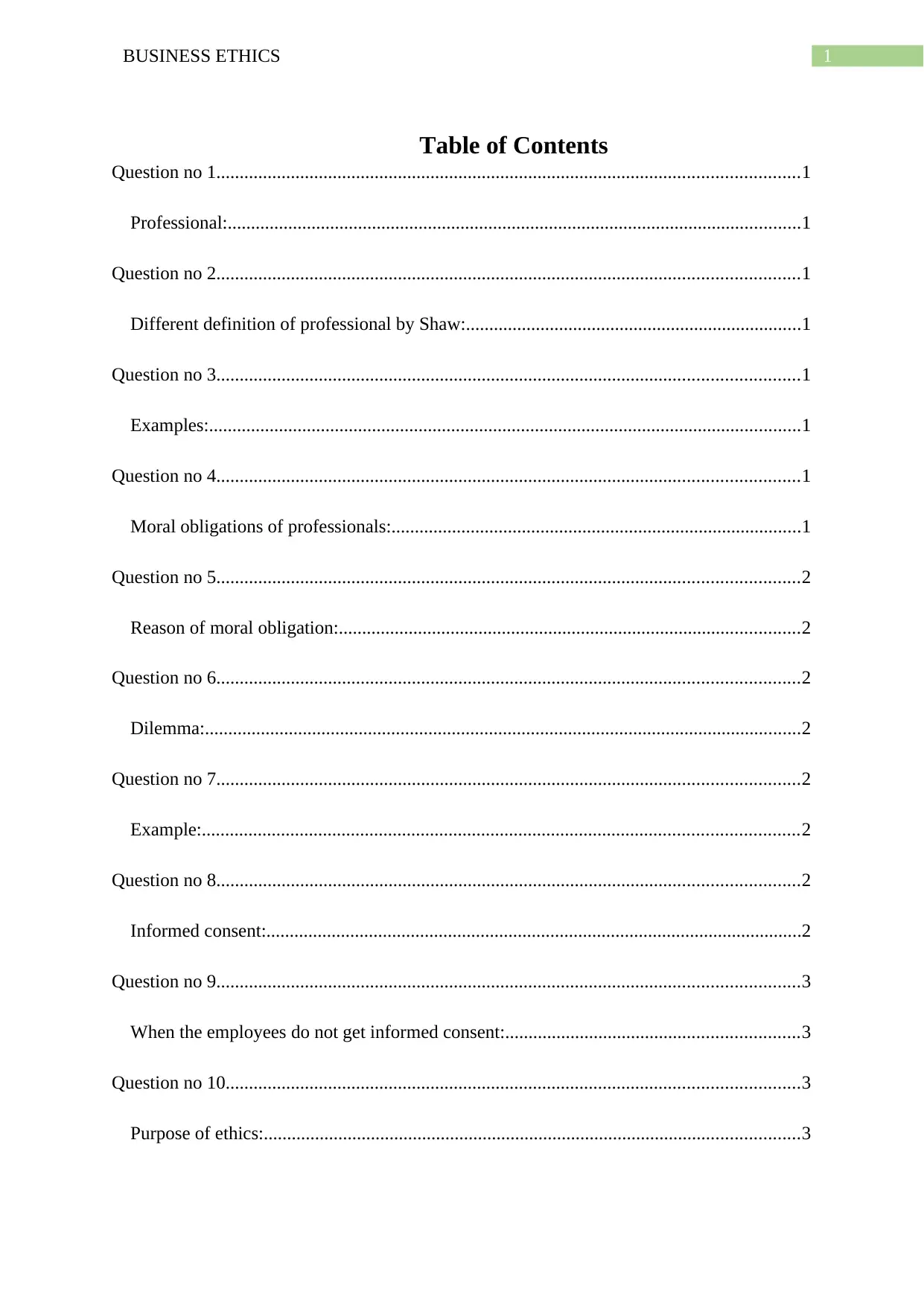
1BUSINESS ETHICS
Table of Contents
Question no 1.............................................................................................................................1
Professional:...........................................................................................................................1
Question no 2.............................................................................................................................1
Different definition of professional by Shaw:........................................................................1
Question no 3.............................................................................................................................1
Examples:...............................................................................................................................1
Question no 4.............................................................................................................................1
Moral obligations of professionals:........................................................................................1
Question no 5.............................................................................................................................2
Reason of moral obligation:...................................................................................................2
Question no 6.............................................................................................................................2
Dilemma:................................................................................................................................2
Question no 7.............................................................................................................................2
Example:................................................................................................................................2
Question no 8.............................................................................................................................2
Informed consent:...................................................................................................................2
Question no 9.............................................................................................................................3
When the employees do not get informed consent:...............................................................3
Question no 10...........................................................................................................................3
Purpose of ethics:...................................................................................................................3
Table of Contents
Question no 1.............................................................................................................................1
Professional:...........................................................................................................................1
Question no 2.............................................................................................................................1
Different definition of professional by Shaw:........................................................................1
Question no 3.............................................................................................................................1
Examples:...............................................................................................................................1
Question no 4.............................................................................................................................1
Moral obligations of professionals:........................................................................................1
Question no 5.............................................................................................................................2
Reason of moral obligation:...................................................................................................2
Question no 6.............................................................................................................................2
Dilemma:................................................................................................................................2
Question no 7.............................................................................................................................2
Example:................................................................................................................................2
Question no 8.............................................................................................................................2
Informed consent:...................................................................................................................2
Question no 9.............................................................................................................................3
When the employees do not get informed consent:...............................................................3
Question no 10...........................................................................................................................3
Purpose of ethics:...................................................................................................................3
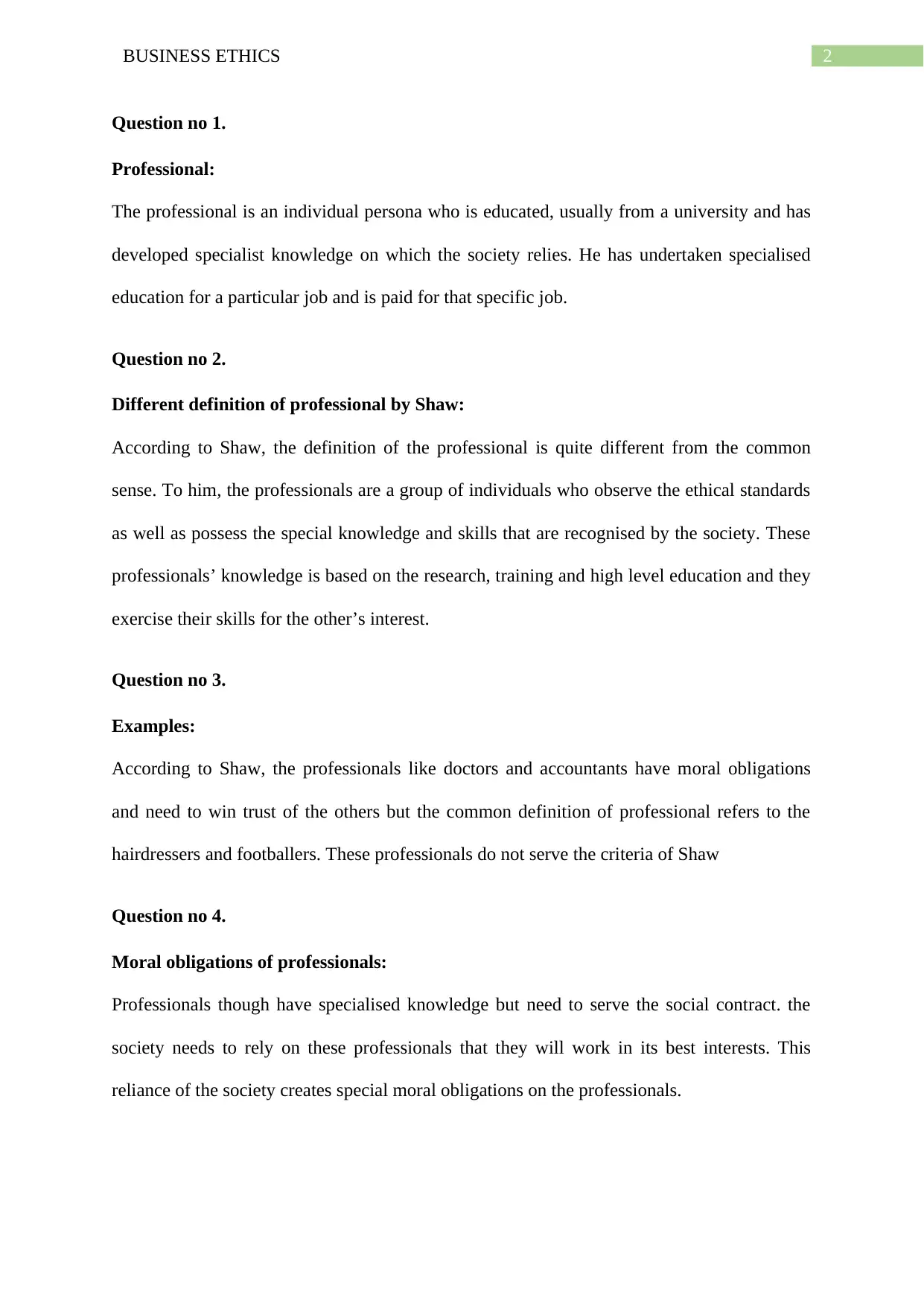
2BUSINESS ETHICS
Question no 1.
Professional:
The professional is an individual persona who is educated, usually from a university and has
developed specialist knowledge on which the society relies. He has undertaken specialised
education for a particular job and is paid for that specific job.
Question no 2.
Different definition of professional by Shaw:
According to Shaw, the definition of the professional is quite different from the common
sense. To him, the professionals are a group of individuals who observe the ethical standards
as well as possess the special knowledge and skills that are recognised by the society. These
professionals’ knowledge is based on the research, training and high level education and they
exercise their skills for the other’s interest.
Question no 3.
Examples:
According to Shaw, the professionals like doctors and accountants have moral obligations
and need to win trust of the others but the common definition of professional refers to the
hairdressers and footballers. These professionals do not serve the criteria of Shaw
Question no 4.
Moral obligations of professionals:
Professionals though have specialised knowledge but need to serve the social contract. the
society needs to rely on these professionals that they will work in its best interests. This
reliance of the society creates special moral obligations on the professionals.
Question no 1.
Professional:
The professional is an individual persona who is educated, usually from a university and has
developed specialist knowledge on which the society relies. He has undertaken specialised
education for a particular job and is paid for that specific job.
Question no 2.
Different definition of professional by Shaw:
According to Shaw, the definition of the professional is quite different from the common
sense. To him, the professionals are a group of individuals who observe the ethical standards
as well as possess the special knowledge and skills that are recognised by the society. These
professionals’ knowledge is based on the research, training and high level education and they
exercise their skills for the other’s interest.
Question no 3.
Examples:
According to Shaw, the professionals like doctors and accountants have moral obligations
and need to win trust of the others but the common definition of professional refers to the
hairdressers and footballers. These professionals do not serve the criteria of Shaw
Question no 4.
Moral obligations of professionals:
Professionals though have specialised knowledge but need to serve the social contract. the
society needs to rely on these professionals that they will work in its best interests. This
reliance of the society creates special moral obligations on the professionals.
⊘ This is a preview!⊘
Do you want full access?
Subscribe today to unlock all pages.

Trusted by 1+ million students worldwide
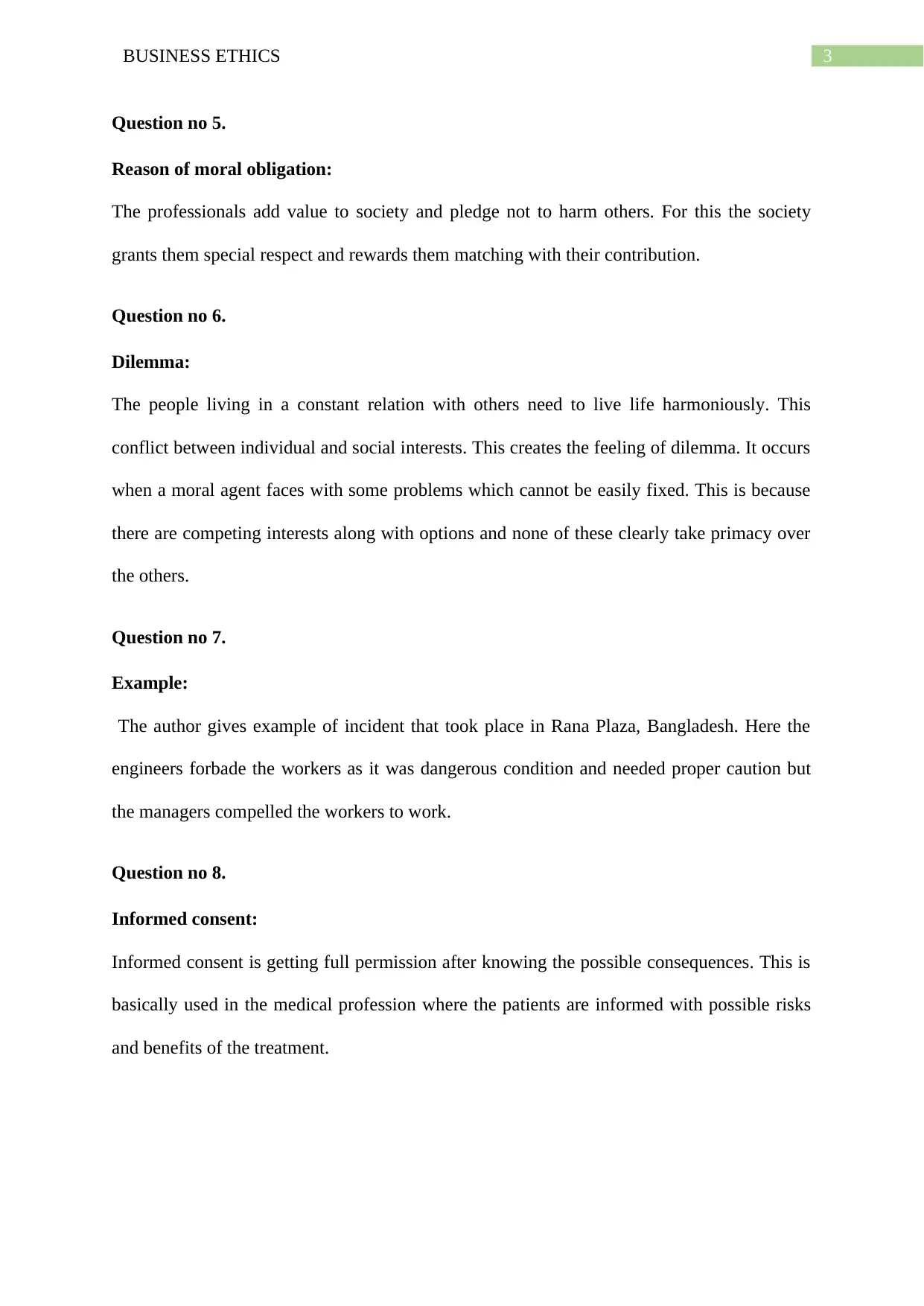
3BUSINESS ETHICS
Question no 5.
Reason of moral obligation:
The professionals add value to society and pledge not to harm others. For this the society
grants them special respect and rewards them matching with their contribution.
Question no 6.
Dilemma:
The people living in a constant relation with others need to live life harmoniously. This
conflict between individual and social interests. This creates the feeling of dilemma. It occurs
when a moral agent faces with some problems which cannot be easily fixed. This is because
there are competing interests along with options and none of these clearly take primacy over
the others.
Question no 7.
Example:
The author gives example of incident that took place in Rana Plaza, Bangladesh. Here the
engineers forbade the workers as it was dangerous condition and needed proper caution but
the managers compelled the workers to work.
Question no 8.
Informed consent:
Informed consent is getting full permission after knowing the possible consequences. This is
basically used in the medical profession where the patients are informed with possible risks
and benefits of the treatment.
Question no 5.
Reason of moral obligation:
The professionals add value to society and pledge not to harm others. For this the society
grants them special respect and rewards them matching with their contribution.
Question no 6.
Dilemma:
The people living in a constant relation with others need to live life harmoniously. This
conflict between individual and social interests. This creates the feeling of dilemma. It occurs
when a moral agent faces with some problems which cannot be easily fixed. This is because
there are competing interests along with options and none of these clearly take primacy over
the others.
Question no 7.
Example:
The author gives example of incident that took place in Rana Plaza, Bangladesh. Here the
engineers forbade the workers as it was dangerous condition and needed proper caution but
the managers compelled the workers to work.
Question no 8.
Informed consent:
Informed consent is getting full permission after knowing the possible consequences. This is
basically used in the medical profession where the patients are informed with possible risks
and benefits of the treatment.
Paraphrase This Document
Need a fresh take? Get an instant paraphrase of this document with our AI Paraphraser
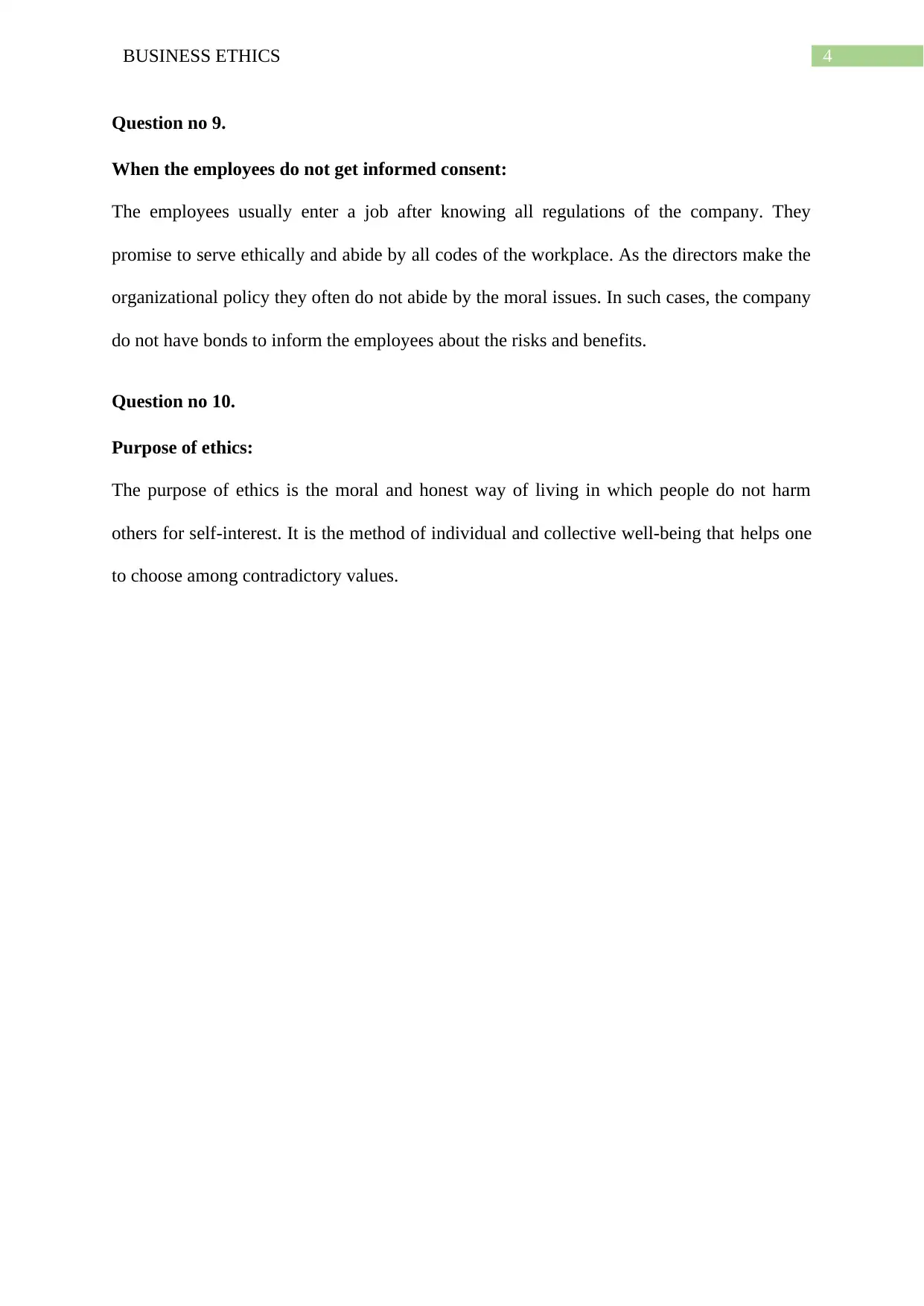
4BUSINESS ETHICS
Question no 9.
When the employees do not get informed consent:
The employees usually enter a job after knowing all regulations of the company. They
promise to serve ethically and abide by all codes of the workplace. As the directors make the
organizational policy they often do not abide by the moral issues. In such cases, the company
do not have bonds to inform the employees about the risks and benefits.
Question no 10.
Purpose of ethics:
The purpose of ethics is the moral and honest way of living in which people do not harm
others for self-interest. It is the method of individual and collective well-being that helps one
to choose among contradictory values.
Question no 9.
When the employees do not get informed consent:
The employees usually enter a job after knowing all regulations of the company. They
promise to serve ethically and abide by all codes of the workplace. As the directors make the
organizational policy they often do not abide by the moral issues. In such cases, the company
do not have bonds to inform the employees about the risks and benefits.
Question no 10.
Purpose of ethics:
The purpose of ethics is the moral and honest way of living in which people do not harm
others for self-interest. It is the method of individual and collective well-being that helps one
to choose among contradictory values.
1 out of 5
Related Documents
Your All-in-One AI-Powered Toolkit for Academic Success.
+13062052269
info@desklib.com
Available 24*7 on WhatsApp / Email
![[object Object]](/_next/static/media/star-bottom.7253800d.svg)
Unlock your academic potential
Copyright © 2020–2026 A2Z Services. All Rights Reserved. Developed and managed by ZUCOL.





